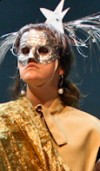Somewhere is a play that ends just as Thomas Middleton’s mid-17th century Women Beware Women begins. In that play, a happy-go-lucky Florentine woos a Venetian lady many levels above his social state, somehow wins her and bings her home to mama, and that might be the end, set with a curlicued “and they lived happily ever after.”
But Middleton picks up after “happily ever after” and it’s pretty much mayhem from that point on. That high-born beauty is spotted in her window by the Duke of Florence, who lusts after her, and the mere expression of his desire turns every noblewoman in the city into a procuress hot to win his favor.
Most of the characters belong to one wretched family: a coven of murderous sisters, a brother who’s a foolish pantalone, another who’s an incestuous brute putting the moves on his own niece. In the different set of scriptures used by the Florentines back then, discretion takes the place of honesty or honor. One perishes not because one is a compendium of evil, but because one has blabbed in the wrong company.
Graham Paul’s production of Women Beware Women at Warren Wilson’s Kittredge Theater is welcome for a number of reasons, one being the comparative rarity of the piece in regional theater. Paul is notable for producing exactly the sort of theater a college should produce, often popular pieces, but often enough masterpieces done so participant and audience can get a taste of mastery in their mouths. Don Baker’s set, a tilted chess-board piazza, was magnificent, and, together with Beverly Ohler’s flawless costuming, gave the crowd the best technical eye-full to be had in Asheville just now. Set and costumes were silent characters, gorgeous and pristine, commenting on human characters who, though they may have been gorgeous, were certainly not pristine.
The inexperience of the young actors was not, in the final analysis, much of a detriment. It was as though we saw a group of undergraduates at the Academy of Evil, trying on their elders’ bloody robes for the first time, working them into perfect fit. Sofia Porter, as Bianca, a saint turned into a fury by one bad date, and Valorie Nichols, as the most smoothly conniving, the most un-apologetically lustful of the aunts, were powerful presences on stage, with sufficient range to take in the acrobatic twist and turns of Middleton’s plot. Motivation is a subtle as a pickaxe in this play. The best thing to do is turn on the dime Middleton provides, and these women did so laudably.
A younger contemporary of Shakespeare, Middleton handles his play as though he had just seen Hamlet and thought the story promising but the proceedings far too thoughtful. Away with the soul-searching; out with the daggers. The Warren Wilson audience often responded with laugher at the moments of highest tragedy, especially at the end when more corpses littered the stage than even Hamlet can boast. (The murderers and the victims were not only the same people, but actors in costume in a court masque — surely Middleton is saying something sharp about the theater.) Such laughter is not inappropriate. The characters are too brassily and easily wicked, too conveniently caught in the webs they have been weaving for others. How to account, then for the final feeling at the end — even through nervous laughter — of magnificence and power bended with dread? One walked to one’s car looking over one’s shoulder.
Learn more about Warren Wilson’s theatre program at http://www.warren-wilson.edu/~theatre.




What a nice review! It really made me wish I had seen the production.
I didn’t see the production either, Theatre Goer, but this review doesn’t surprise me. Most Warren Wilson Theatre shows are fantastic and I have seen a lot of good actors emerge therefrom. The theatre program there is quite good. Also, I believe that at least before the flood of 2004 they had the largest props or perhaps costume storage in the region, and still have an impressive inventory. For that, Hopes’ praise of the set does not surprise me.
More good insights from Mr. Hopes here: http://tinyurl.com/68uqulb